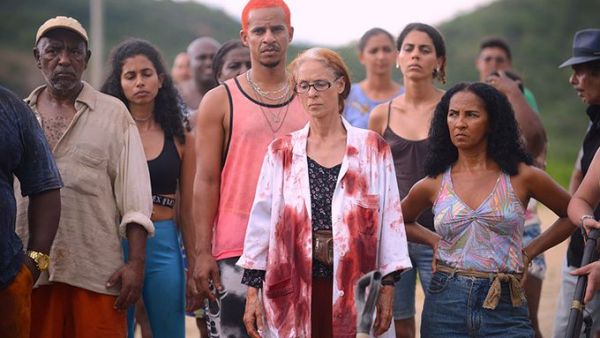Every year the spring-summer film festival season unveils a handful of titles that grab the attention of juries, critics and audiences.
Few generate unanimous adoration. Some lodge in your brain, like a glass splinter from a broken window.
“Bacurau” is among this year’s cinematic shards.
A contemporary Western, co-written and directed by Kleber Mendonca Filho and Juliano Dornelles, it debuted in Cannes’ main competition, where it shared the Jury Prize with Ladj Ly’s “Les Miserables.”
The film commences retro fashion, with the night sky framing an extended list of credits, accompanied by a pop tune redolent of the late-’60s or early ’70s. The camera pans left from the starry sky to show the Earth’s southern hemisphere. A satellite passes through the frame, as if to say, “The music’s vintage, but this story belongs to today.”
It zooms on northeastern Brazil, where a water truck is following a dirt track to a village called Bacurau. The driver is swerving to avoid coffins littering the road. When he runs over one of them his passenger, a young doctor named Teresa (Barbara Colen), awakens in time to see the accident that has caused a truck to lose its load of coffins, and leave a corpse on the road.
Before reaching Bacurau, the trucker points out an improvised dam that’s blocked the river that used to supply the village. The gunman guarding the dam promptly fires a warning shot at them.
{"preview_thumbnail":"https://cdn.flowplayer.com/6684a05f-6468-4ecd-87d5-a748773282a3/i/v-i-f…","video_id":"f8412085-2fcf-48ec-b9dc-2af246aa9d1a","player_id":"8ca46225-42a2-4245-9c20-7850ae937431","provider":"flowplayer","video":"Lebanese Hold Largest Protests Ever in Central Beirut"}
Teresa has returned home for the funeral of her grandmother Carmelita, the village matriarch. The ceremony begins soon after her arrival, with the help of a hit of a psychotropic drug the village herbalist slips into her mouth.
The doctor bears an ice chest of medications for Domingas (Sonia Braga), Bacurau’s colorfully alcoholic medic. Shortly after her return Teresa hooks up with the local social media sensation, whose followers call him Trigger Killer Pacote (Thomas Aquino), after the viral montage of CCTV videos of him gunning down shopkeepers.
Teresa’s partnering with Pacote offers of a dose of ambiguity that will make some uncomfortable. Indeed, as the film develops, Teresa sinks into the village ensemble, while Pacote becomes more central.
Bacurau is under siege - cut off from its water supply and bereft of food shipments - because of Tony Junior, the scumbag absentee notable who’s running for mayor.
The sense of isolation is underlined when the village teacher (Wilson Rabelo) asks his students to locate Bacurau on a map and neither they nor he can find it, as if it’d been erased from Brazil’s map.
Tony Junior himself rolls into town with his entourage to announce that, when elected, he’ll see to the difficulties the village’s been suffering. All the villagers need do is submit to a retina scan that will allow him to register their votes with the state. To demonstrate his sincerity, the politician has his goons unload a few boxes of (expired) supplies, while a truck dumps a load of old paperbacks into the dirt for Bacurau’s public library.
The townsfolk retain a sneering skepticism of Junior and the political class that he represents. As he’s leaving, he bundles the town prostitute Sandra (Jamila Facury) into the back of his SUV. “If she comes back damaged,” Domingas warns Tony, “I’ll cut off your cock and feed it to the chickens.”
Things go from bad to weird. A character is buzzed by a drone modeled on a ’50s-era Hollywood flying saucer. A heard of horses belonging to a local rancher inexplicably gallop into town one night. The water truck returns to town peppered with bullet holes. Then, after a couple of middle-class tourists show up in Bacurau on trail bikes, the villagers lose all mobile phone and internet access.
The bikers are the Brazilian associates of a gang of heavily armed English-speaking foreigners camped outside town. They’re led by a German named Michael (Udo Kier), who dresses like a great white hunter on safari. The foreigners’ demented conversation (and ham acting, Kier excepted) signals it’s obvious things will get much worse for Bacurau, though by then the killings have begun in earnest.
When villagers start dying, Pacote seeks help from gang of rural bandits, led by the psychopathic Lunga, though it’s the (nude) village herbalist who claims the first blood of resistance.
The balance of the story unfolds as an old-fashioned retribution tale that fans of Quentin Tarantino’s work will recognize and may appreciate for its quirkiness as much as the righteousness of its violence.
That’s not to reduce “Bacurau” to Tarantino rip-off. Filmmakers Filho and Dornelles are students of Cinema Novo, Brazil’s school of modernist experimentation. “Bacurau” nods particularly to the work of Glauber Rocha (1939-81), who made a couple of films based on the life of Antonio das Mortes, a notorious 19th-century bandit who strode Brazil’s rural northeast.
Filho has used Cannes as a platform to express his criticism of Brazil’s current regime. Though cheesy at times, it’s difficult not to see “Bacurau” as a poetic call to arms for his countrymen to join together in resisting the contemptuous arrogance they have witnessed in the behavior of their country’s political class.
Road closures allowing, “Bacurau” will screen at Metropolis-Sofil Tuesday Oct. 22 at 8 p.m., as part of the interrupted Ibero-American Film Festival. For confirmation, see metropoliscinema.net.
This article has been adapted from its original source.








